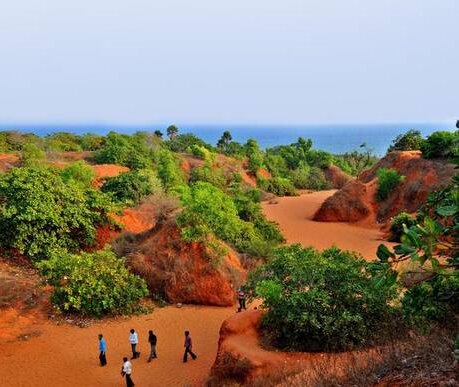UNESCO Global Geoparks | 18 Nov 2020
Why in News
The Indian National Trust for Art and Cultural Heritage (INTACH) is making efforts to get recognition of a geopark for Visakhapatnam (Andhra Pradesh) consisting of Erra Matti Dibbalu (red sand dunes), natural rock formations, Borra Caves and volcanic ash deposits.
- While there are 161 UNESCO Global geoparks spread across 44 countries, India is yet to have one of its own.
Key Points
- Meaning:
- These are single, unified geographical areas where sites and landscapes of international geological significance are managed with a holistic concept of protection, education and sustainable development.
- Features:
- Management:
- These are managed by a body having legal existence recognized under national legislation.
- It needs to be noted that UNESCO Global Geopark status does not imply restrictions on any economic activity inside a UNESCO Global Geopark where that activity complies with indigenous, local, regional and/or national legislation.
- Visibility:
- Geoparks are sustained through geo tourism activities like excursions, nature trails, guided tours, hiking and academic meets.
- Networking:
- Cooperating with the local people (bottom-up approach) living in the geopark area and with other UNESCO Global Geoparks through the Global Geoparks Network (GGN).
- GGN, of which membership is obligatory for UNESCO Global Geoparks, is a legally constituted not-for-profit organisation with an annual membership fee. It was founded in 2004.
- Cooperating with the local people (bottom-up approach) living in the geopark area and with other UNESCO Global Geoparks through the Global Geoparks Network (GGN).
- Management:
- Designation Period:
- A UNESCO Global Geopark is given this designation for a period of four years after which the functioning and quality of each UNESCO Global Geopark is thoroughly re-examined during a revalidation process.
- Global Geoparks vs Biosphere Reserves and World Heritage Sites:
- Besides UNESCO Global Geoparks, there are other two UNESCO site designations, Biosphere Reserves and World Heritage Sites.
- Biosphere Reserves focus on the harmonised management of biological and cultural diversity.
- Out of 18 notified biosphere reserves, India has 12 biosphere reserves under the World Network of Biosphere Reserves (WNBR), the latest one included is Panna Biosphere Reserve.
- World Heritage Sites promote the conservation of natural and cultural sites of outstanding universal value.
- India has 38 world heritage sites, including 30 cultural properties, 7 natural properties and 1 mixed site. The latest one included is Jaipur city, Rajasthan.
- UNESCO Global Geoparks give international recognition for sites that promote the importance and significance of protecting the Earth’s geodiversity through actively engaging with the local communities.
- India does not have any UNESCO Global geopark.
- Biosphere Reserves focus on the harmonised management of biological and cultural diversity.
- Besides UNESCO Global Geoparks, there are other two UNESCO site designations, Biosphere Reserves and World Heritage Sites.
UNESCO
- UNESCO is the United Nations Educational, Scientific and Cultural Organization. It seeks to build peace through international cooperation in Education, the Sciences and Culture.
- UNESCO's programmes contribute to the achievement of the Sustainable Development Goals defined in Agenda 2030, adopted by the UN General Assembly in 2015.
- UNESCO-IOC (Intergovernmental Oceanographic Commission) is leading a global effort to establish ocean-based tsunami warning systems as part of an overall multi-hazard disaster reduction strategy.
- Recently, UNESCO-IOC approved the recognition of two communities of Odisha viz., Venkatraipur and Noliasahi as Tsunami Ready Communities.
- It has 193 Members and 11 Associate Members. India joined UNESCO in 1946.
- It is headquartered in Paris, France.
Visakhapatnam’s Case
- Important Sites:

- Erra Matti Dibbalu:
- It is coastal red sediment mounds located between Visakhapatnam and Bheemunipatnam.
- The width of sandy red dunes vary from 200 metres to two kilometres, spread across five kilometres along the coast.
- Such sand deposits have only been reported from two other low latitude tropical regions in South Asia — the Teri Sands of Tamil Nadu and Red Coastal Sands of Sri Lanka.
- It is among the 34 notified National Geological Heritage Monument Sites of India by the Geological Survey of India (GSI).
- The term geological heritage is used for natural geological or geo-morphological features that have aesthetic, intrinsic or scientific and educational value, that provide unique insight into geological processes affecting the formation or evolution of Earth.
- Natural Rock Formations (Eastern Ghats) at Mangamaripeta:
- One example is the natural arch at Mangamaripeta beach opposite the Thotlakonda Buddhist Site.
- It is likely to date back to the period after the last Ice Age around 10,000 years ago and is similar to the natural rock arch of Silathoranam in the Tirumala Hills.
- Borra Caves:
- Discovered by William King George of the GSI, these one million year old caves attract a huge number of tourists every day. These are located at an elevation of 1400 m above sea level.
- These caves are known for stalactite and stalagmite formations such as Shiva-Parvathi, Rishi's Beard, Mother-Child, Crocodile, Human Brain, Tiger and Cows udder.
- Volcanic Ash Deposits:
- These are said to have originated from the volcanic eruption of Toba in Indonesia 73,000 years ago near Araku (Andhra Pradesh).
- Erra Matti Dibbalu:
- Concerns:
- Red sands are being exploited for construction activity. Further, degradation due to human interference such as digging, climbing, littering are affecting their stability and exacerbating erosion.
- The recent incident of overcrowding and reckless acts of visitors endangering the natural arch has raised concerns among geologists and heritage activists on the need to safeguard the sites of the region and establish a geo park.
- Conservation Efforts:
- In July 2019, INTACH organised a campaign to create public awareness on geologically and culturally important spots in the region.
- INTACH was founded in 1984 in New Delhi with the vision to spearhead heritage awareness and conservation in India.
- In July 2019, INTACH organised a campaign to create public awareness on geologically and culturally important spots in the region.
